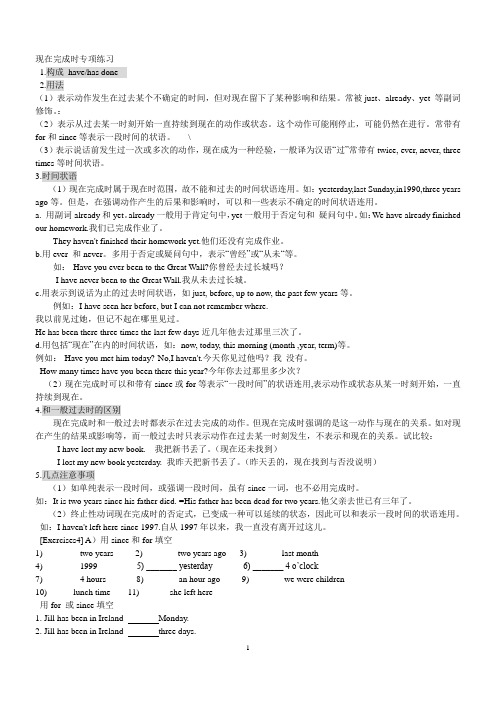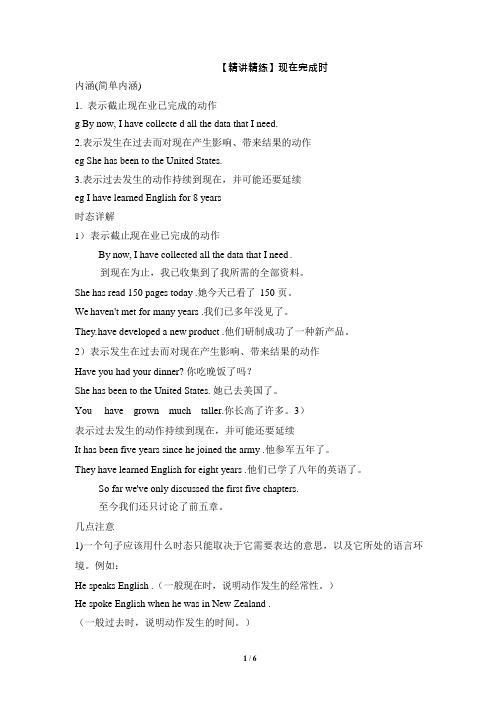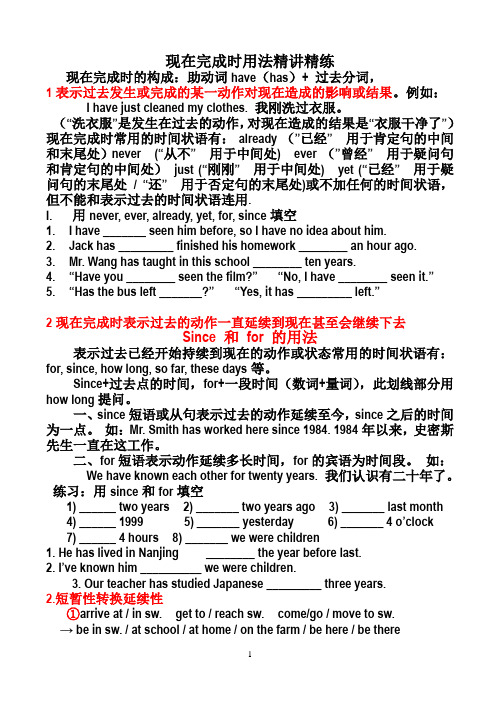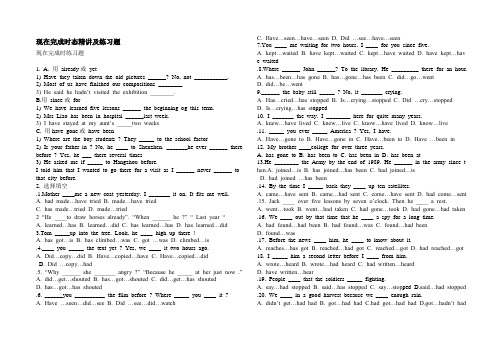初三英语 动词的现在完成时态 精讲精练
新北师大本九年级现在完成时讲解及习题

现在完成时专项练习1.构成have/has done2.用法(1)表示动作发生在过去某个不确定的时间,但对现在留下了某种影响和结果。
常被just、already、yet 等副词修饰。
:(2)表示从过去某一时刻开始一直持续到现在的动作或状态。
这个动作可能刚停止,可能仍然在进行。
常带有for和since等表示一段时间的状语。
\(3)表示说话前发生过一次或多次的动作,现在成为一种经验,一般译为汉语―过‖常带有twice, ever, never, three times等时间状语。
3.时间状语(1)现在完成时属于现在时范围,故不能和过去的时间状语连用。
如:yesterday,last Sunday,in1990,three years ago等。
但是,在强调动作产生的后果和影响时,可以和一些表示不确定的时间状语连用。
a. 用副词already和yet。
already一般用于肯定句中,yet一般用于否定句和疑问句中。
如:We have already finished our homework.我们已完成作业了。
They haven't finished their homework yet.他们还没有完成作业。
b.用ever 和never。
多用于否定或疑问句中,表示―曾经‖或―从未―等。
如:-Have you ever been to the Great Wall?你曾经去过长城吗?-I have never been to the Great Wall.我从未去过长城。
c.用表示到说话为止的过去时间状语,如just, before, up to now, the past few years等。
例如:I have seen her before, but I can not remember where.我以前见过她,但记不起在哪里见过。
He has been there three times the last few days近几年他去过那里三次了。
中考英语复习 【精讲精练】现在完成时

【精讲精练】现在完成时内涵(简单内涵)1.表示截止现在业已完成的动作g By now, I have collecte d all the data that I need.2.表示发生在过去而对现在产生影响、带来结果的动作eg She has been to the United States.3.表示过去发生的动作持续到现在,并可能还要延续eg I have learned English for 8 years时态详解1)表示截止现在业已完成的动作By now, I have collected all the data that I need .到现在为止,我已收集到了我所需的全部资料。
She has read 150 pages today .她今天已看了150 页。
We haven't met for many years .我们已多年没见了。
They have developed a new product .他们研制成功了一种新产品。
2)表示发生在过去而对现在产生影响、带来结果的动作Have you had your dinner? 你吃晚饭了吗?She has been to the United States. 她已去美国了。
You have grown much taller.你长高了许多。
3)表示过去发生的动作持续到现在,并可能还要延续It has been five years since he joined the army .他参军五年了。
They have learned English for eight years .他们已学了八年的英语了。
So far we've only discussed the first five chapters.至今我们还只讨论了前五章。
几点注意1)一个句子应该用什么时态只能取决于它需要表达的意思,以及它所处的语言环境。
人教版九年级英语精品讲义-现在完成时精讲精练(学生卷)

专题04现在完成时精讲精练模块一:结构公式模块二:现在完成时有两个主要用法模块三:have been VS have gone模块四:特别句型模块五:现在完成时和过去时区别模块一:结构公式:sb.have/has done时间状语:already,yet,just,so far,never,ever,since+过去时间点,for+一段时间,in thepast/last few years现在完成时的简单定义:1)过去发生的动作对现在产生一定的影响;2)过去发生的动作一直延续到现在。
比较:(学生版不出现)I had10hamburgers today.(今天“吃”的行为已结束,10为最终结果。
)I have had10hamburgers today.(今天到目前为止吃了10个,可能很饱,也可能还不尽兴。
)模块二:现在完成时有两个主要用法*Hanged,hanged绞死Hung,hung悬挂Lie躺lay,lain,lying;说谎lied,liedLay放置,下蛋laid,laid(雷的,雷的)♥Attention♥你还能列出现在完成时的一些时间状语吗?recently,lately,总次数……(XX times)1.since用法结构公式:现在完成时+since+一般过去式/过去的时间状语1)I’ve known my best friend since we were in high school.2.瞬间动词不能直接和for,since的完成时连用瞬间动词变成延续动词1)borrow---_____keep______________2)buy-----_______have______________3)catch a cold----_have a cold_________4)die---_________be dead___________5)fall asleep---___be asleep___________6)fall ill-----______be ill______________7)join------_______be in______________8)leave---_______be away____________9)marry----______be married_________10)start----_______be on______________11)end----_______be over___________模块三:have been VS have gone总结:模块四:特别句型a.It/This+is+序数词+n+现在完成时It is the first time that I’ve seen such a wonderful performance.这是我第一次看到如此精彩的表演。
现在完成时中考高频考点总结(讲义)2024年英语中考三轮复习语法专题

2024年初三英语中考三轮复习【语法专题】现在完成时中考高频考点总结(讲义)用法a:表示过去某时刻发生的动作对现在造成的影响或结果:常与already, yet, just, ever, never... before, this morning, now, today, so far, in the last/past+时间段, over+时间段, recently, by+现在时间等连用;b: 从过去某一时刻开始,一直延续到现在的动作或状态:后者常与for引导的一段时间或since引导的时间点或过去时间状语从句连用。
Jack has just turned off the light. 杰克刚刚把灯关上。
(结果:现在灯灭着)I have lost my pen. 我把钢笔丢了。
(结果:我现在没有钢笔用。
)James is on holiday. He has gone to Italy. (= He is there now or on his way there)吉姆斯在度假。
他去意大利了。
(人可能已经到了或者在路上)Amy is back home now. She has been to Italy. (=she has now e back.)艾米现在回家了。
她去过意大利。
(人已经回来了)现在完成时的常见标志语(1)already已经already通常用于肯定句中,可放在助动词之后,过去分词之前,也可放在句末。
I've already read this book.我已经读过这本书了。
I've washed my clothes already.我已经洗了衣服。
注意在表示吃惊或明知故问等感情色彩时,already也可用于疑问句中。
如Have you met him already? 你(真的)已经见过他了?(2)yet已经;还yet用在疑问句中,意为“已经”,用在否定句中意为“还”,常放在句末。
初中现在完成时讲解与练习全

1)一般过去时表示过去某时发生的动作或单纯叙述过去的事 情,强调动作;
现在完成时为过去发生的,强调过去的事情对现在的影响, 强调的是影响。
be away be here be on(上演) be over be in be married
1. 他的爷爷已经去世2年了。 2. Nick 参军3年了. 3. 他离开深圳好长时间了。 4. 这本书我已借了4个月了.
I have kept the book for 4 months.
method 2:
I worked here for more than twenty years. (我现在已不在这里工作。)
I have worked here for many years. (现在我仍在这里工作。)
现在完成时 Present perfect 句型
1.肯定句
“主语 + have(has)+过去分词”。
3. Mum’s cooked the dinner. Mum _______ ________ the dinner.
4. Susan’s learned English at school.
Susan ________ _le__a_r_n_e__dEnglish at school.
疑问句
Have you eaten your breakfast? 现在完成时的一般疑问句形式
for+ 时间段 since+时间点 , since+ 句子
比较since和for since 用来说明动作起始时间— “自从……”
for用来说明动作延续时间长度— “长达……”
I have lived here for more than twenty years. I have lived here since I was born. My aunt has worked in a company since 1949. I have not heard from my uncle for a long time. 注意:并非有for 作为时间状语的句子都用现在完成时
现在完成时用法精讲精练(1)

现在完成时用法精讲精练现在完成时的构成:助动词have(has)+ 过去分词,1表示过去发生或完成的某一动作对现在造成的影响或结果。
例如:I have just cleaned my clothes. 我刚洗过衣服。
(“洗衣服”是发生在过去的动作,对现在造成的结果是“衣服干净了”)现在完成时常用的时间状语有:already (”已经” 用于肯定句的中间和末尾处)never (“从不” 用于中间处)ever (”曾经” 用于疑问句和肯定句的中间处)just (“刚刚” 用于中间处)yet (“已经” 用于疑问句的末尾处/ “还” 用于否定句的末尾处)或不加任何的时间状语,但不能和表示过去的时间状语连用.I.用never, ever, already, yet, for, since填空1. I have _______ seen him before, so I have no idea about him.2. Jack has _________ finished his homework ________ an hour ago.3. Mr. Wang has taught in this school ________ ten years.4. “Have you ________ seen the film?” “No, I have ________ seen it.”5. “Has the bus left _______?” “Yes, it has _________ left.”2现在完成时表示过去的动作一直延续到现在甚至会继续下去Since 和for 的用法表示过去已经开始持续到现在的动作或状态常用的时间状语有:for, since, how long, so far, these days等。
Since+过去点的时间,for+一段时间(数词+量词),此划线部分用how long提问。
初中英语现在完成时精讲精练ppt课件

真题再现
2. --Look! Someone ______ the classroom. --Well, it wasn’t me. I didn’t do it.
A. is cleaning B. was cleaning C. has cleaned D. will clean
现在完成时意义与一般过去时的区别
延续动词与非延续动词
现在完成时表持续,在肯定句和疑问句中动词要用延续性动词
延续性动词:动作可持续 learn, work, stand, lie, know, walk, keep, wait, watch, sing, read, sleep, live, stay, have
非延续性动词:动作不可持续,只发生在一瞬间 buy, borrow, die, leave, begin, join
Linda has found her book. 结果:不需要再找了。
真题再现
1. I don’t feel very well, Jack. I’m afraid you ______ me your cold.
A. give B. had given C. have given D. would give
小试牛刀
3. --Look at the blue sky! The rain _______. --Let's go out for a walk.
A. stops B. will stop C. has stopped D. had stopped
小试牛刀
4. He _______ the city since he graduated from college.
延续动词与非延续动词
九年级现在完成时精讲及练习

现在完成时态精讲及练习题现在完成时练习题1. A. 用already或yet1) Have they taken down the old pictures ______? No, not ___________.2) Most of us have finished our compositions ________3) He said he hadn’t visited the exhibition ________.B.用since或for1) We have learned five lessons ______ the beginning og this term.2) Mrs Liao has been in hospital ______last week.3) I have stayed at my aunt’s _____two weeksC. 用have gone或have been1) Where are the boy students ? They _____ to the school factor2) Is your father in ? No, he ____ to Shenzhen. _______he ever ______ there before ? Yes, he ___ there several times3) He asked me if _____ to Hangzhou before.I told him that I wanted to go there for a visit as I ______ never ______ to that city before.2. 选择填空.1.Mother ____me a new coat yesterday. I _______ it on. It fits me well.A. had made…have triedB. made…have triedC. has made…triedD. made…tried2 “He ____to draw horses already”. “When ______ he ?” “ Last year “A. learned...has B. learned...did C. has learned...has D.has learned (i)3.Tom _____up into the tree. Look, he ____ high up there !A. has got…isB. has climbed…wasC. got …wasD. climbed…is.4.____ you _____ the text yet ? Yes, we ____ it two hours ago.A. Did...copy...did B. Have...copied...have C. Have...copied (i)D. Did …copy…had.5. “Why ______ she _______ angry ?” “Because he _____ at her just now .”A. did…get…shoutedB. has…got…shoutedC. did…get…has shoutedD. has…got…has shouted.6. ______you __________ the film before ? Where _____ you ____ it ?A. Have …seen…did…seeB. Did …see…did…watchC. Have…seen…have…seenD. Did …see…have…seen7.You ____ me waiting for two hours. I ____ for you since five.A. kept…waitedB. have kept…waitedC. kept…have waitedD. have kept…hav e waited.8.Where ______ John ______? To the library. He _________ there for an hour.A. has…been…has goneB. has…gone…has beenC. did…go…wentD. did…be…went9.______ the baby still _____ ? No, it _______ crying.A. Has…cried…has stoppedB. Is…crying…stoppedC. Did …cry…stoppedD. Is…crying…has st opped10. I _______ the way. I ________ here for quite many years.A. knew...have lived C. knew...live C. know...have lived D. know (iv).11. _____ you ever _____ America ? Yes, I have.A. Have…gone toB. Have…gone inC. Have…been toD. Have …been in12. My brother ____college for over three years.A. has gone toB. has been toC. has been inD. has been at13.He ________ the Army by the end of 1989. He ______ in the army since t hen.A. joined…is B. has joined…has been C. had joined…isD. had joined …has been.14. By the time I _____ back they ____ up ten satellites.A. came…have sentB. came…had sentC. come…have sentD. had come…sent .15. Jack ____ over five lessons by seven o’clock. Then he ____ a rest.A. went…tookB. went…had takenC. had gone…tookD. had gone…had taken .16. We ____ out by that time that he ____ a spy for a long time.A. had found…had beenB. had found…wasC. found…had beenD. found…was.17. Before the news ____ him, he ____ to know about it.A. reaches…has gotB. reached…had gotC. reached…gotD. had reached…got18. I _____ him a second letter before I ____ from him.A. wrote…heardB. wrote…had heardC. had written…heardD. have written…hear.19. People ____ that the soldiers _____ fighting.A. say…had stoppedB. said…has stoppedC. say…stop pedD.said…had stopped .20. We ____ in a good harvest because we ____ enough rain.A. didn’t get…had hadB. got…had hadC.had got…had hadD.got…hadn’t had21. They _______ for five hours when they ______ in New York.A. flew…arrivedB. had flown…had arrivedC. flew…had arrivedD. had flown…arrived22. She ____ that it _____ for two days by that day.A. says…has rainedB. says…had rainedC. said…had rainedD. said…rained.23. John _____ there since the year before, so he _____ themA. had worked…knewB. had worked…had knownC. worked…knewD. worked…had known.24. He _____ angry because he ____ for a long time.A. had got…had waitedB. got…waitedC. had got…waitedD. got…had waited第一部分:现在完成时表示过去发生或已经完成的动作对现在造成的影响或结果,也可表示过去已经开始,一直延续到现在的动作或状态。
- 1、下载文档前请自行甄别文档内容的完整性,平台不提供额外的编辑、内容补充、找答案等附加服务。
- 2、"仅部分预览"的文档,不可在线预览部分如存在完整性等问题,可反馈申请退款(可完整预览的文档不适用该条件!)。
- 3、如文档侵犯您的权益,请联系客服反馈,我们会尽快为您处理(人工客服工作时间:9:00-18:30)。
初三英语上册【动词的现在完成时态】精讲精练2018.12一、构成形式(肯定式): 主语+助动词have/has+过去分词+…….﹡过去分词: 规则动词的过去分词构成与动词过去式相同;不规则动词需要专门记忆。
[Exercise 1]( ) 1. I Enghish in this school since 1998.(A) taught (B) have taught (C) teach (D) would teach( ) 2. Li Lei the pen for five years.(A) has had (B) bought (C) had (D) has bought( ) 3. Kate her grandmother's photo before.(A) haven't seen (B) have seen (C) saw (D) hasn't seen( ) 4. Mary you these days?(A) Has, seen (B) Do, see (C) Did, see (D) Is, seeing( ) 5. So far, we thousands of Buildings in Quanzhou.(A) build (B) have built (C) build (D) will build二、否定式: 主语+haven’t/hasn’t+过去分词+…….疑问式: Have/Ha s+主语+过去分词+……?简略答语: Yes, 主语+have/has.(肯定回答) / No, 主语+haven’t/hasn’t.(否定回答)[Exercise 2]( ) 1. He finished his homework yet.(A) doesn’t(B) haven’t(C) hasn’t (D) doesn’t have( ) 2. —Have you finished your work? —(A) Yes, I do. (B) No, I didn’t. (C) Yes, I have. (D) No, I won’t.( ) 3. —Has she ever learned English? —.(A) Yes, she has (B) No, she doesn’t(C) Yes, she does (D) No, she didn’t三、现在完成时的用法之一: 表示过去发生或已经完成的某一动作对现在造成的影响或结果。
常与already,just,yet, ever/never,before,twice,so far等连用。
(这些标志词可以表达这种含义。
)⑴以already, just和yet为标志already, just和yet表示到现在为止动作或状态已经、刚刚或还没有发生。
He has already had dinner. He has just seen the film. He hasn’t come back yet.⑵以ever和never为标志ever和never表示到现在为止动作或状态曾经或从来没有发生过。
This is the best film I have ever seen. He has never been to Beijing.⑶以动作发生的次数为标志若某一动作到现在为止已经发生了若干次,则要使用现在完成时。
He says he has been to the USA three times.⑷以so far为标志so far往往表示到目前为止动作或状态已经发生。
So far about 500 people have died in the earthquake. She has passed the exam so far. [Exercise 3]( ) 1. —Have you travelled on the train? —Yes, I have.(A) never (B) ever (C) just (D) yet( ) 2. —Have you finished your homework? —Not .(A) ever (B) already (C) yet (D) just( ) 3. We haven't finished our homework .(A) already (B) ever (C) yet (D) never( ) 4. —Have you learned English? —Yes, I've learned a lot.(A) never, ever (B) ever, never (C) ever, already (D) already; ever( ) 5. —Have you finished your homework ? —Yes, I've done that .(A) yet, already (B) already, yet (C) ever, never (D) still, just( ) 6. John's father borrowed some pictures.(A) have already (B) has just (C) have ever (D) has yet四、现在完成时的用法之二: 表示过去已经开始,一直延续到现在的动作或状态。
常与for,since,how long,these days,in /for/during the last/past … years/months/weeks/days 等连用。
⑴◆since+过去的时间点◆since+时间段+ago◆since+从句(一般过去时)此部分用how long提问。
Mr. Smith has worked here since 2000.Xiao Ming has played the piano since 5 years ago.He has learned about 5,000 English words since he went to college.⑵for+时间段(数词+量词)此部分用how long提问。
We have known each other for twenty years.I haven’t seen her for a long time.※注:since+时间段+ago =for+时间段⑶We’ve planted thousands of trees in the past few years. 过去几年我们已种了成千上万棵树。
I have been here for the last month. 最近一个月里我一直在这儿。
[Exercise 4]A)用since和for填空。
1) ______ two years 2) _______ two years ago 3) _______ last month4) ______ 1999 5) _______ yesterday 6) _______ 4 o’clock7) ______ 4 hours 8) _______ an hour ago 9) _____ lunch time10) _______ we were children 11) ______ she left hereB)用since和for填空。
1. He has lived in Nanjing ________ the year before last year.2. I’ve known him ________ we were young.3. Our English teacher has taught English ________ twenty years.4. She has been away from the city ________ about ten days.5. It’s about t wo years ________ she left the city.C)选择填空( ) 1. I've been like this ever since .(A) last week (B) for a week (C) a week before (D) the last week( ) 2. My mother has worked in this factory 2 years.(A) about (B) for (C) in (D) since( ) 3. I haven't heard from him last week.(A) since (B) for (C) ago (D) before( ) 4. His father joined the Party _________.(A) for three years (B) since three years ago (C) three years ago (D) in two years' time ( ) 5. He moved here in 1999, and he has been here .(A) at that time (B) for five years ago (C) since four years (D) for four years( ) 6. Tom has been away from home about five days ago.(A) \ (B) in (C) since (D) for五、句式:主句(现在完成时)+since+从句(用一般过去时)[Exercise 5]( ) 1. She Enghish in our school ever since she here.(A) has taught, came (B) taught, came(C) has taught, has come (D) teaches, has come( ) 2. Shanshan in Laiwu since she born in 1999.(A) has lived, has been (B) has lived, was(C) lived, has been (D) lived, was六、句式:It is/has been+时间段+since从句(用一般过去时)[Exercise 6]( ) 1. It’s ten years since she.(A) has left (B) has been away (C) left (D) leaves( ) 2. It has been three years since he the army.(A) has joined (B) has been in (C) join (D) joined七、have/has been in, have/has been to 与have/has gone to 的用法⑴have/has been in+地点:表示“在某地住/呆/留(多长时间)”,常与表示一段时间的状语,如since, for, how long 等连用。
